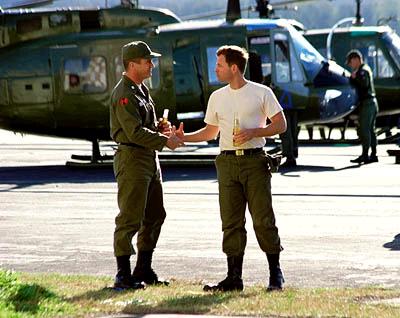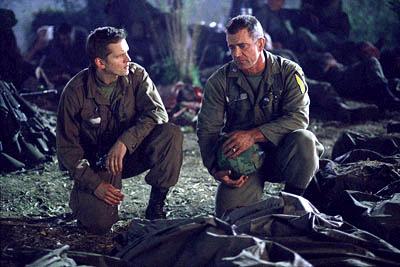

Movies about the Vietnam War frequently wallow in cynicism and moral ambiguity, raising questions about the validity of the conflict itself and reason why the United States should or should not be there in the first place. We Were Soldiers only touches on these things briefly, preferring to celebrate the heroism of its subjects. It makes the film much more one-sided (although there are attempts to do otherwise) and, unfortunately, a little more shallow that it could be. We Were Soldiers is based on the book We Were Soldiers Once, and Young by Lt. Gen. Harold G. Moore and journalist Joseph L. Galloway (both of whom served as consultants for the film. Their book chronicled Moore and his soldiers' battle in the Ia Drang Valley at Vietnam in mid-November 1965. This battle occurred at the beginning of America's involvement in the Vietnam War, so public knowledge of events was not high.
Moore (Mel Gibson, What Women Want, The Patriot) worries over the dual duties of leading his soldiers and raising his children. He has an almost fatherly affection for both. His wife Julie (Madeleine Stowe, Impostor, The General's Daughter) cares for the wives of the soldiers like Moore treats his men. Once he lands at the Ia Drang valley, he needs to face insurmountable odds as the Viet Cong surround his men and rush forward with what looks like unlimited resources. Many of his men are young and inexperienced, and all are unfamiliar with the surrounding land. Unlike the recent Black Hawk Down, We Were Soldiers does take the time to let the viewer know the soldiers, which include a grizzled Sgt-Maj. Basil Plumley (Sam Elliot, The Contender, Fail Safe), helicopter pilot Bruce Crandall (Greg Kinnear, Someone Like You, The Gift), and Lt. Jack Geoghegan (Chris Klein, Rollerball, American Pie 2). However, it gives the actors too little to do. Kinnear and Klein have little screen time, and are recognizable only because they are established actors. Their roles almost feel like afterthoughts. Galloway (Barry Pepper, Battlefield Earth, The Green Mile) enters the picture more than halfway through. He narrates We Were Soldiers and is able to provide a sense of detachment, to view the events with a more journalistic approach.
Randall Wallace (The Man in the Iron Mask, and writer of Pearl Harbor) wants the film to take on an epic scope. He takes the time to show how the Viet Cong strategize, and spends times with Julie, Barbara Geoghegan (Keri Russell, Mad About Mambo, the WB's Felicity) and the other wives of the soldiers. It does humanize both sides, especially the enemy, but feels like Wallace is trying to milk sympathetic reaction for the movie, especially in near-cutesy scenes with Moore's children. He laces his dialogue with nearly every military cliche in history, lessening the power of some of the images and sequences. Gibson does have a commanding presence, adding sense, gravity and experience to counteract the apprehension his men feel. Moore is like an unstoppable machine that cannot be killed. His performance is slightly wooden, given the confines of the script.
The battle scenes take up the bulk of the movie. They are intense, but not as much as the ones from Saving Private Ryan and Black Hawk Down. The gore is there, but gone is the fancy editing techniques that make the grisly scenes so much more visceral. In a way, this is a more 'classical' way of shooting war scenes. There is enough violence to illustrate the horrors of war (which is always one of the goals of these types of movies), and We Were Soldiers also does shed light on an important event that previously did not receive that much exposure. Nevertheless, overall, this movie falls somewhere in the spectrum between Behind Enemy Lines (near blatant propaganda) and Black Hawk Down, but thankfully closer to the latter.